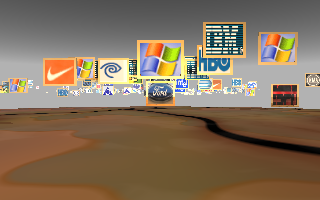

|
Information |
| On 2002 March 21, I had the pleasure of seeing something of mine published as a Letter to the Editor of The Washington Post. I was responding to what I viewed as a specious letter by Ralph Oman, former US Registrar of Copyright. |
| The actual process of getting a letter published was interesting in its own right. I emailed a letter to the Letters to the Editor mailbox at The Post. Within a few days, I received a very polite letter asking for some clarification and minor edits. I began a short correspondence with someone at The Post, wrapping up in my (half-joking) request that my middle initials be printed without the periods (which is how I always sign things). I was told that the Post's stylebook precluded that and asked if they could still use the letter. |
| It actually didn't end there. I also received a phone call from a very nice person at the paper. She asked for some clarification on "the issue". I fear I talked her ear off for half an hour about the arcane -- but, I believe, absolutely vital -- twists of copyright law and why I felt so strongly. She also asked, once again, if I was really determined to have those periods dropped. I assured her that it didn't really matter to me, so she could add the periods and get her editors off her back. :) |
| I am actually quite proud of my letter. It's easy enough to rail about changes we don't like, but not enough people who have knowledge also have the drive to inform others. I think if the American people were told forthrightly what Congress has given away in the past decade, we would see a real flare of protest. People don't know what's going on, and it's the duty of those who do to tell them. |
| I am also inordinately please that I managed to force the phrase "Content Cartel" into print. :) |
| The letter prompting me to write was penned by Ralph Oman, a former registrar of copyright. Rather than abuse the good graces of the Post by copying the whole text here, I will refer the Good Reader to the online version. In print, it appeared on Monday, March 11, 2002; Page A20. I think the gist of Mr. Oman's position is given away by his categorization and dismissal as "special pleaders" of such nefarious groups as "small businesses, veterans' groups, bars, scholars, restaurants, fraternal groups, marching bands, Boy Scout troops, nursing homes, libraries, radio broadcasters and home tapers" (emphasis mine). Well, I know that I have always worried about the damage to our cultural institutions done by librarians, so thank goodness the recording and movie ndustries have stepped in to marginalize them. |
| The following irony is just too good to pass up, and boy, do I wish I had caught it. At the end of his letter, Mr. Oman claims, "It would be a switch-a- roo worthy of Lucy yanking away Charlie Brown's football" if the Supreme Court voided the Sony Bono Copyright Extension Act. As pointed out by Post reader Brian Heller in his letter, "Ironically, Mr. Oman closes his specious argument with an uncited reference to copyrighted cartoon characters, thereby demonstrating the great importance of public domain, and the value of protecting public use of creative works." Bravo, Mr. Heller! |
|
http://www.washingtonpost.com/ac2/wp-dyn?pagename=article&node=&contentId=A59275-2002Mar20 Thursday, March 21, 2002; Page A34 Ralph Oman's position [letters, March 11] is understandable, as he was registrar of copyright when the ill-advised term "intellectual property" arose at that office, transforming copyright from a bargain struck between author and public into an unassailable property right. This transformation came about with no public debate and no historical basis. Perhaps Mr. Oman should remember that copyright originally applied only to actual books (not music, not video, not software -- not even player piano music sheets). So somehow Congress has "whittled away" rights by extending them. Meanwhile, under the whittling away of copyright, Congress has ensured
that no works produced in the 21st century will enter public domain
during that same century. Imagine if Shakespeare's heirs could still
claim "ownership" of his plays? That bleak cultural wasteland
now faces us, in no small part because of the efforts of Mr. Oman
and other cronies of the content cartel. BERNARD H. P. GILROY |
|
My Own Little Manifesto: A Letter to the Editor of The Washington Post |